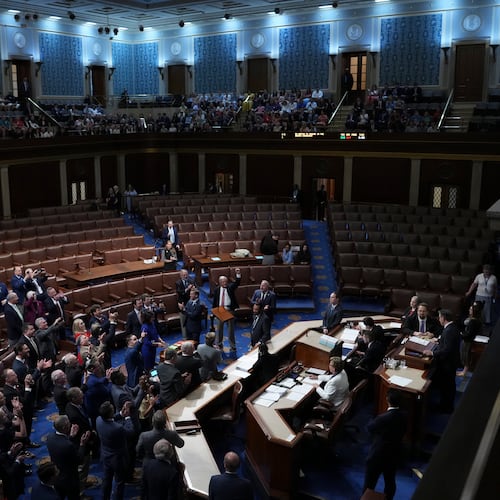Legislative sessions have a particular rhythm. They start slowly, then pick up the pace as more bills are filed and vetted by committees. There’s a rush to the first deadline, Crossover Day. Then a short breather, and an even more furious sprint to the Day 40 finish.
At the end there may be suspense. There are sometimes surprises, and often disappointments. But there are no cliffhangers. When it’s over, it’s over.
Or that’s how it used to be.
As the 2018 session opens this week, many eyes will be on such worthy topics as rural development, mass-transit funding, health care and tax reform. But the session’s rhythm and tone will hinge on the fate of one bill left clinging to life last year.
In turn, we’ll see what becomes of the fracturing relationship between House members who see themselves as policy workhorses and a Senate they view more as a stable of politically ambitious show horses.
Let’s take a step back, to the 2017 session. House Bill 159 by Rep. Bert Reeves, R-Marietta, would have updated the state’s adoption laws for the first time in two decades. Reeves spent a couple of years working on it, a worthwhile pursuit to help some desperate children.
The House had approved it more than a month earlier. Senators took it up weeks later but sent it back to committee. By the end of Day 40, it had re-emerged as a lengthy addendum to a barely related Senate measure, which is how things get done around there sometimes.
In the end, though, it fell victim to a last-minute effort to add protections for faith-based adoption agencies that don’t want to work with same-sex couples.
How to accommodate those agencies is a debate worth having. It’s not the kind of issue that should be handled hastily, after a multiyear legislative process. Unable to agree on how to move forward, senators sent it back to committee again and adjourned.
That’s how HB 159 became a litmus test for some powerful House members tired of what they see as constant political posturing from the other chamber.
How and when the bill is resolved will affect the rhythm and pace of this election-year session. While a number of prominent folks in the Senate are running for higher office, from Lt. Gov. Casey Cagle to Sens. David Shafer and Josh McKoon, none of the House leadership is doing so. It’s clear they feel no pressure to adjourn quickly so their Senate counterparts can resume fund-raising and campaigning; when I asked one House wag if I was wise not to make plans for spring break in early April, he replied: “Or Memorial Day.”
(The primary is May 22, six days before Memorial Day. He was joking — I hope.)
Rushing senators will be in an awkward position. They often complain they don’t have the time to deal with the huge flow of bills that come from the larger House, which has 180 members to its 56. Last year, the chambers agreed to move Crossover Day from its traditional Day 30 slot to the 28th day. They also agreed to take two “committee days” in the middle of the following week to let Senate committees get to work vetting House bills.
Just five of the chamber’s 29 committees opted to meet on those two days. Five others scheduled meetings but canceled them. House members haven’t forgotten that, either.
This is where many GOP senators would object that the House didn’t cooperate last year by passing their priority bills. True, but 2017 was also not the first time this dance has gone on. It’s just the first time it meant some kids who need new families were kept from getting them.
How that cliffhanger is resolved will tell us a lot about how the rest of the session will go.
About the Author
Keep Reading
The Latest
Featured



